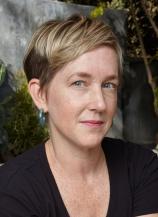California
Review
California
CALIFORNIA, Edan Lepucki’s debut novel, is an ingenious hybrid. Her book is a post-apocalyptic variation on the commune novel, with scruffy folks living in the wilderness and trading for necessities with members of traditional society. Cross a hippie book like T.C. Boyle’s DROP CITY with the sensibility of a George Saunders, and you’d have a work that resembles CALIFORNIA. It’s a great idea. The novel succeeds only intermittently, but that doesn’t take away from Lepucki’s admirable ambition.
The book is set in the Pacific Northwest in what we assume is the 2050s --- one character tells a young girl that her bob haircut resembles the style worn by 1920s flappers from 130 years earlier. Cal and Frida are a young married couple who lived in Los Angeles before earthquakes devastated the city. The wreckage was so great that the film industry moved away, and wealthy residents formed gated Communities (Lepucki’s capitalization) outside the city. Chain stores throughout the country perished, shopping malls closed, and fountains dried up. Cal and Frida were eager to leave.
"CALIFORNIA, Edan Lepucki’s debut novel, is an ingenious hybrid. Her book is a post-apocalyptic variation on the commune novel... Cross a hippie book like T.C. Boyle’s DROP CITY with the sensibility of a George Saunders, and you’d have a work that resembles CALIFORNIA."
Another factor motivated their escape. Cal attended Plank College in California with Frida’s brother, Micah. Plank was a two-year school with 30 male students who lived together in a converted farmhouse. During a late-night chat, Cal, Micah and others discussed a German film about terrorists from the 1970s. “Violence is beautiful, in a way,” Micah said. He didn’t elaborate, but no one was surprised when the Group, an organization Micah joins, transformed itself from a league of pranksters into a militant collective so furious at the rich Communities that they dragged a knife across a woman’s throat at a political fundraiser and captured a gubernatorial candidate. Micah, who became a leader in the Group, later strapped dynamite to his body and blew himself up at a Los Angeles shopping mall. Thirty-one people died. Copycat bombings in other US cities followed. After Micah’s death, Frida could no longer live in LA. So she and Cal move to the wilderness to rebuild their lives.
They live in a shack in the forest. The only people they ever see are a man named August, who shows up once a month to sell them goods, and the Millers, a married couple and their two young children. Cal and Frida have heard rumors of Pirates who plunder the countryside. Life is tough but manageable.
However, that changes when two events occur: they discover that the Millers are dead from poisoning, and that Frida may be pregnant. Frida and Cal fear for their lives. Cal had heard of a nearby group known as the “Spike People,” who have secured their borders with tall metal spikes and who “believe in containment.” He and Frida pack up their belongings and head into the forest in search of this group. They find the Spike People, but the secrets they discover about this collective make them wonder if they might have been better off where they were.
Flashbacks in fiction can be problematic. If an author overuses them, they halt the story. Debut novelists often struggle with this: too many flashbacks create an information dump. The first third of CALIFORNIA is filled with flashbacks, hence the frequent use of the past tense in this review. Rarely does a page of present action pass without Lepucki stopping to give us someone’s backstory. This is an awkward way to introduce information.
Yet the novel builds tension beautifully in its middle chapters. By alternating between Cal’s and Frida’s perspectives, Cal learns facts that are withheld from Frida, and vice versa. This technique creates nice moments of drama. The book has lovely flashes of wit, including sly jokes about IKEA and Jonathan Franzen. And Lepucki skillfully suggests that, in some cases, the wealthiest members of society are not much different from bands of marauding pirates.
Unfortunately, the final third of CALIFORNIA consists mainly of characters explaining events to Cal and Frida. Very little of what takes place has anything to do with present circumstances. The revelations are interesting, but they would have had more resonance if we had seen them play out rather than heard about them second-hand.
Lepucki is clearly a talented writer, and there’s much to like about CALIFORNIA. One hopes that, in the sophomore effort she deserves, she figures out how to blend story elements better. The Stephen Colbert bump did wonders for the book’s sales, but it can’t hide its limitations.
Reviewed by Michael Magras on July 11, 2014
California
- Publication Date: July 7, 2015
- Genres: Fiction, Post-Apocalyptic Fiction
- Paperback: 416 pages
- Publisher: Back Bay Books
- ISBN-10: 031625083X
- ISBN-13: 9780316250832





